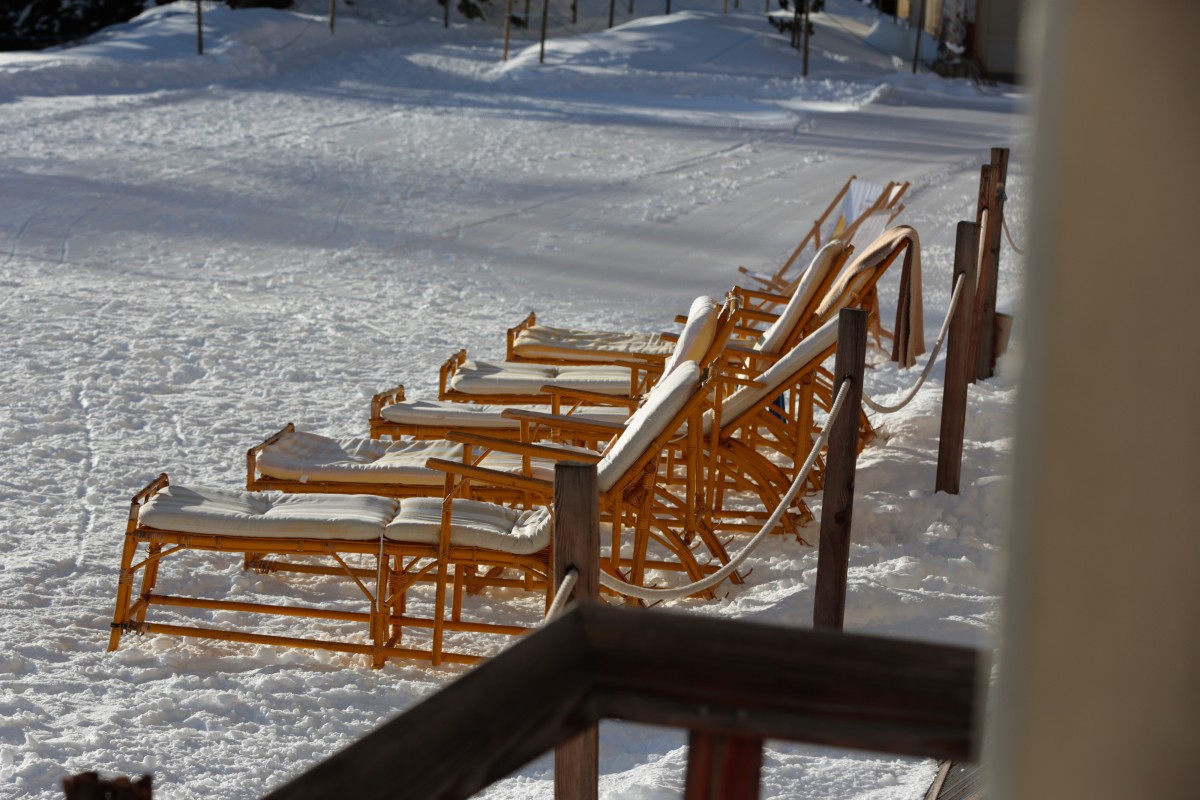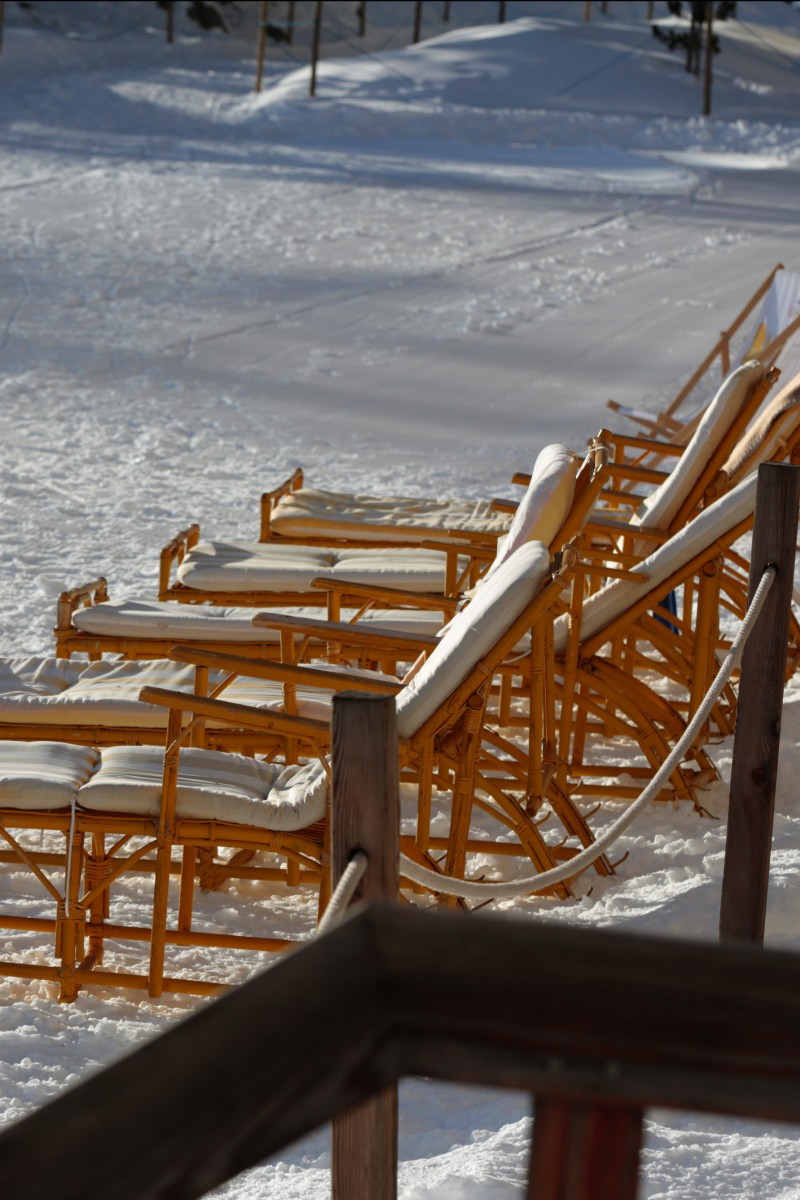 Empty sun loungers sit on a snow terrace outside a restaurant near the Schatzalp funicular ahead of the World Economic Forum (WEF) in Davos, Switzerland, on Tuesday, Jan. 20, 2015.
Empty sun loungers sit on a snow terrace outside a restaurant near the Schatzalp funicular ahead of the World Economic Forum (WEF) in Davos, Switzerland, on Tuesday, Jan. 20, 2015. What is Davos?
Davos is a four-day conference at a Swiss ski resort. But it has become much more. For participants it is a festival of networking. Getting an invitation is a sign you have made it - and the elaborate system of badges reveals your place in the Davos hierarchy.
For critics, “Davos man” is shorthand for the globe-trotting elite, disconnected from their home countries after spending too much time in the club-class lounge. Others just wonder if it is all a big waste of time.
Who is there?
More than 2,500 people - business leaders, politicians, diplomats and the odd celebrity - have flown in to take part in the 45th annual Davos meeting. As usual most delegates are men: just 17 per cent of attendees are women. Although the forum boasts delegates from more than 100 countries, the largest number are from western Europe, followed by the United States. The smallest number of delegates come from Latin America and Africa.
The average age for male attendees is 53 and 48 for women.
This year, around 40 national leaders will put in an appearance at Davos, which can be a coming-out party for politicians new to the world stage. One of the most closely watched Davos debuts will be Egypt’s president, Abdel Fatah al-Sisi. The former army chief won an election in May, after ousting the Islamist president, Mohamed Morsi the previous year.
Other world leaders in attendance include Chinese premier Li Keqiang, French president François Hollande and German chancellor Angela Merkel. Britain's Prime Minister David Cameron is not going this year, although former Prime Minister Tony Blair and Prince Andrew are.
The roll call of chief executives includes Google’s Eric Schmidt, Facebook’s Sheryl Sandberg, General Motors’ Mary Bara, Unilever’s Paul Polman and Santander’s Ana Botin.
How did they get there?
The private jet is mode of choice for the 1per cent. Around 1,700 private jets will land at Swiss airports this week, around twice as many as normal and 5 per cent more than last year, according to CNN . Private jet companies have warned it will be hard to find landing spots.
What are they talking about?
The official theme for this year’s event is the “new global context”, broadly defined as conflicts, instability and the political, economic and technological changes that make the world a more fragmented place.
Instability
Conflict is the top issue for the global elite at Davos, following a year dominated by the rise of Islamic State (Isis) and fighting in eastern Ukraine. Petro Poroshenko, the president of Ukraine, was in Davos but forced to cut his visit short, amid intensifying fighting around Donetsk.
Global economy
For Davos insiders, the big story is the world economy. The US is doing quite nicely, China is slowing down, the eurozone is weak. On the eve of the Davos meeting, the International Monetary Fund cut its global growth forecasts, citing the slowdown in China, looming recession in Russia and continuing problems in the eurozone. The Washington-based fund expects the global economy to grow by 3.3 per cent in 2015, compared to its earlier forecast of 3.8 per cent and 3.5 per cent growth in 2014.
Climate change
Climate change was not mentioned in a recent survey of 19 issues causing concern for business leaders. But Al Gore and singer Pharrell Williams have forced the issue onto the agenda. Appearing on the stage at Davos, the unlikely pair announced a second round of Live Earth concerts to promote awareness of global warming. The concerts will take place across all seven continents - including Antarctica - on 18 June.
Inequality
In the wake of the global financial crash, Davos went through a period of soul searching, which resulted in a focus on inequality and social problems. Although delegates’ interest in inequality has waned, the pressure has not. Earlier this week Oxfam warned that by next year, 1 per cent of the world’s population will own more wealth than the other 99 per cent if current trends continue. Winnie Byanyima, executive director of Oxfam International and one of the six co-chairs at this year’s WEF, said the increased concentration of wealth was dangerous and bad for growth and governance.
Who started Davos?
The conference was founded in 1971 by the German-born economist Klaus Schwab in a bid to encourage European business men (and they were mostly men) to learn about American management practices.
One of the first guests was the renowned economist John Kenneth Galbraith , best known for his critique of private affluence amid public squalor. The first political leaders were invited in 1974, amid uncertainty about an upsurge in conflict in the Middle East, rising oil prices and economic disarray after the collapse of the Bretton Woods system. In 1987, Davos was named the World Economic Forum, which is also the name of the non-profit organisation that organises the conference.
Who pays for Davos?
Davos is funded by around 1,000 of the world’s biggest companies, who pay hefty subscription fees to be WEF members. Once they have paid their fees, only then are the great and the good of the corporate world eligible to buy a ticket to Davos. In 2011, New York Times journalist Andrew Ross Sorkin put the price of going to Davos at US$71,000 (£47,000), excluding hotel and travel costs. The organisers provoked anger last year when they raised fees by 20 per cent for elite members : 120 “strategic partners”were asked to pay 600,000 Swiss francs (£462,000) for their annual membership - described as “outrageous” by one executive.
Has anything useful ever happened at Davos?
The organisers of Davos would point to a series of big encounters: the 1988 Davos declaration between Greece and Turkey is cited as helping the two nations avoid war.
Davos was also the venue for discussions on German reunification in 1989 between German chancellor Helmut Kohl and the leaders of east Germany.
F.W de Klerk and Nelson Mandela shared the stage in 1992, in their first joint appearance outside South Africa.
In recent years, Davos is better known as venue for showcasing conflict: in 2009 Turkey’s leader Recep Tayyip Erdogan stormed off the stage , after a fierce argument with Israel’s president Shimon Peres over Gaza.
In 2001, the Bill and Melinda Gates Foundation pledged US$100 million to tackle AIDS.
In 2007 Nicholas Negroponte launched his “One laptop per child campaign” to bring cheap computers to children in developing countries.
But is is more likely than not these encounters would have happened without the bracing mountain air of Davos. Bill Gates and Nelson Mandela added stardust to Davos, rather than the other way around.
So what's wrong with Davos?
The main charge against Davos is that it is little more than a talking shop, where elites enjoy consensus over fondue.
A more serious criticism is that Davos breeds groupthink. In the mid 2000s, Davos-goers ignored warnings about the riskiness of global finance. Anti-poverty campaigners argue that a new “dangerous delusion” has taken root. According to Global Justice Now, today’s consensus is that the poor are getting richer, despite the fact that the number of people living in poverty in sub-Saharan Africa - on less than US$2 a day - has doubled to 562 million since 1981.
